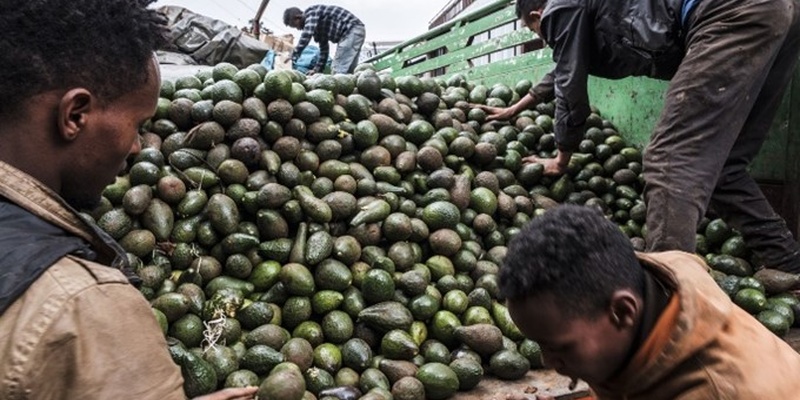SPOTLIGHT: Ethiopia’s phytosanitary capacity assessment to build stronger systems and accelerate legal reform
Posted on Tue, 17 Jun 2025, 07:40

Men manipulate avocados in a basket in Atikilt Tera, in Addis Ababa. © FAO/Eduardo Soteras
While Ethiopia has been providing phytosanitary services for over three decades to protect and conserve the country’s agriculture and biodiversity, no comprehensive national phytosanitary capacity evaluation (PCE) had been undertaken until 2024. A PCE is essential for evaluating a country’s phytosanitary system by identifying gaps and recommending solutions to fix them.
Recognizing this critical gap, the national plant protection organization (NPPO), under the Ethiopian Agricultural Authority (EAA), mobilized donor support. As a result, the Standards and Trade Development Facility funded a project proposal grant to carry out a full capacity evaluation using the PCE tool developed by the International Plant Protection Convention (IPPC). Launched in November 2024, the PCE was implemented by FAO Ethiopia, with technical PCE facilitation provided by the Food and Agriculture Organization of the United Nations (FAO) Subregional Office for Eastern Africa (SFE). A complementary FAO technical support project covered some of the costs of the series of workshops.
The PCE is a collaborative process through which IPPC contracting parties engage key stakeholders to assess national phytosanitary systems. Spearheaded by a country's NPPO, the process helps identify major organizational and technical gaps in the phytosanitary system. It enables stakeholders to determine the problems, analyse the impacts and develop logical frameworks and workplans, based on set modules, to address the gaps.
The PCE consists of 13 modules, which Ethiopia undertook, engaging a broad range of stakeholders who have direct support roles in plant health matters. Participants included representatives from the Ministry of Agriculture, agricultural research institutes, academia, producer and exporter associations, the Legal Affairs Office of the Prime Minister, the Ministry of Justice, the Civil Service Commission, core phytosanitary personnel and the EAA.
After conducting situational analyses through five consecutive workshops, Ethiopia undertook all modules and consolidated all the separate module-based strategic plans. It developed a five-year phytosanitary strategy which will help the Ethiopia NPPO to respond better to the country’s needs. The strategy is seen to boost agricultural export and prevent the entry of alien species that may pose as a biosecurity threat to agriculture and international trade. Additionally, the country is poised to fulfill its global obligations by complying with the IPPC standards better. This ensures the long-term safeguarding of national plant health and the integrity of international trade.
During the workshops, policy and legal instruments emerged as the most critical gaps. Although the development of the Plant Quarantine Proclamation and its accompanying regulation began over ten years ago, institutional restructuring and organizational change in the ministry delayed its ratification, now in its final stage. Implementation of PCE Module 2 on developing new or revised national phytosanitary legislation helped integrate key elements into the draft legislation, strengthening it. Already approved by Ethiopia’s Council of Ministers, once ratified by the House of Representatives, the legislation will provide a comprehensive legislative framework to enforce phytosanitary measures in Ethiopia.
"On behalf of the FAO, I would like to congratulate Ethiopia for achieving this milestone in its efforts to strengthen national plant protection and phytosanitary systems”, said Farayi Zimudzi, FAO Subregional Coordinator and Representative to the African Union and United Nations Economic Commission for Africa (UNECA), a.i.
“Completing the full PCE process, with support from FAO and key partners is a significant accomplishment. Most notably, the process has catalyzed long-overdue progress on critical legal reform. I am glad to know that Ethiopia’s Plant Quarantine Proclamation has now reached its final stage. As we look ahead, we are confident that the remaining issues will be addressed, paving the way for the official publication of a comprehensive legislative instrument that will effectively enforce phytosanitary measures. This will not only enhance plant health governance in Ethiopia but also boost agricultural trade and align the country more closely with international phytosanitary standards. FAO is proud to have contributed to this process and remains fully committed to supporting Ethiopia on its path towards more resilient, inclusive, and sustainable plant health systems”, she added.
This article was contributed by the Ethiopian Agricultural Authority, FAO Ethiopia and FAO Subregional Office for Eastern Africa.
Related information

